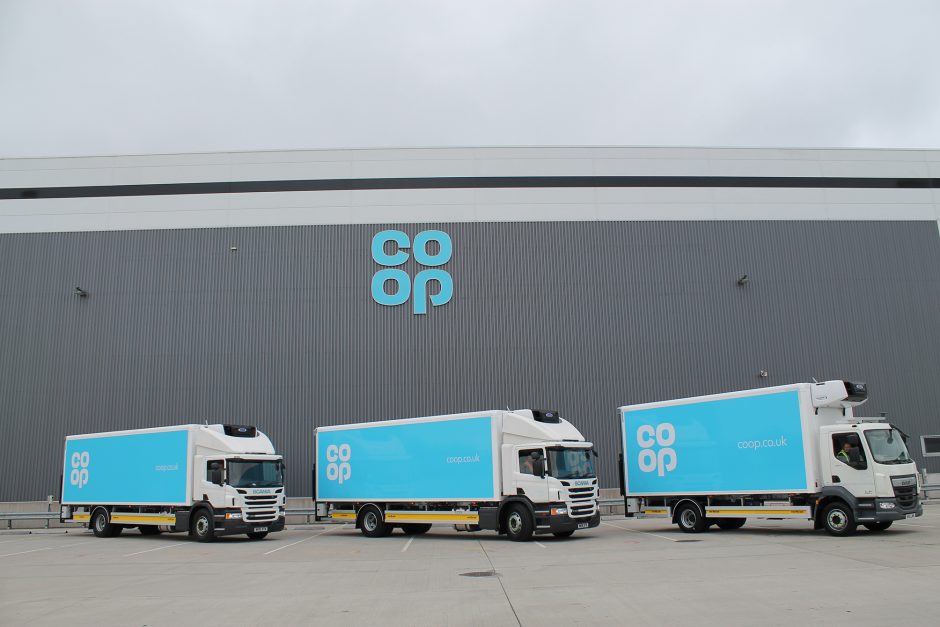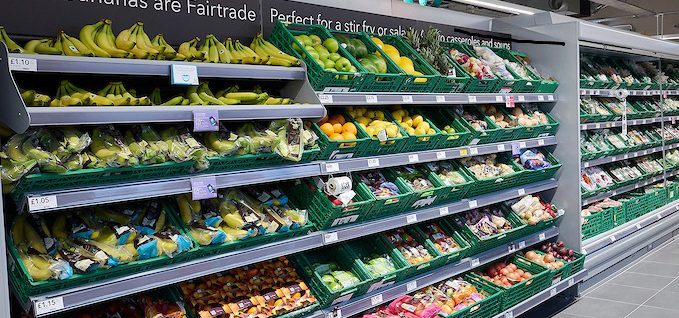The Co-op Group has issued its annual results for the year to 31 December 2023, with net debt cut to £82m from £322m last year.
This continues an improvement in the retailer’s financial position, with its recent troublesome debts slashed by 90% from more than £900m two years ago, helped by last year’s sale of its petrol forecourts.
Underlying financial performance was strengthened, the Group added: operating profit was £66m, up from a loss of £12m in 2022. Pre tax profit was £28m, compared to last year’s £268m – a figure skewed by a one-off sum from the sale of the forecourts, which also saw food revenue fall to £11.3bn (2022: £11.5bn). Excluding the impact of the forecourt sale, food revenue rose 4.7%, or £0.5bn, the Group added.
“The results that we’ve announced today show that we’re back in control our business and our future destiny,” said CEO Shirine Khoury-Haq. “Despite the continued challenging economic backdrop, we’ve delivered a world class sales performance with all our business units delivering increased revenue during the year.”
Related: Report from Co-operative Retail Conference 2024
Inflationary pressures have eased but are still an issue, the Group added, although Matt Hood, managing director of the Food business, told a press call that the retailer’s emphasis on British suppliers would protect it from the continued impact of Brexit on import costs.
Meanwhile, the Group says it “surpassed expectations with substantial membership growth, now reaching 5 million active member-owners” and is on course for its target of 8 million by 2030. It reiterated its support for members, colleagues and communities with a “£90m investment in lowering food prices and improved member-owner offers”.

“Our relentless focus on strengthening our financial position has enabled us to navigate a highly turbulent external landscape,” added Khoury-Haq, “delivering increased value for our member-owners and planning for a future with confidence and with membership firmly back at the heart of our business.
“I’d like to thank all our exceptional colleagues, who have been instrumental in our success over the last year.
“2024 marks a significant shift as we begin putting in place the building blocks for our strategic growth plans across our Co-op, with a focus on growing our existing businesses including increasing our share of the quick commerce market and expanding our presence within the life services sector.”
Other efforts include continued lobbying and increased security measures to tackle violent retail crime; £24m raised to support local communities, “with 4 million people benefiting in our members’ communities”; the Group becoming the “first national retailer to become a champion of Sustainable Palm Oil communities, based in the UK, promoting sustainable palm oil practices and advocating for meaningful action”; and “a £1m commitment to our Academy schools – including providing access to food supporting just under 150 families a week, through Community Fridges at Co-op Academy Failsworth, Priesthorpe, Manchester and Oakwood”.
Related: Co-op Group and Midcounties’ net zero targets validated by SBTi
In terms of the Group’s store estate, the retailer is planning a mix of new store openings and growing its franchise businesses. Hood told the press call: “The healthy balance sheet and the position that we’re now in means we are significantly reducing disposals. We’ve actually put a lot of processes in place that analyse every shop to make sure everything was always given the best opportunity to deliver a profitable contribution.
“Any stores that we have disposed of that we feel we haven’t been able to make work, we are still keeping within our network. We have a good partnership with our wholesale partners where we we do sell some stores through to them but generally we are now out of disposals and back acquisitions again.
“We have got exciting plans in place for both our own real estate as well as the continued growth of wholesale and franchise.”
The press call saw Khoury-Haq defend the co-op model from some sceptical questioning, the the Telegraph asking if the problems at John Lewis meant that “the mutual model is broken”.
“I would never comment on another organisation,” said Khoury-Haq, “but you’ve seen our membership rises. We absolutely believe in co-operative model and that this model is right … given what’s happening in the world, given the advocacy that people can have, given the say that they can have in how this business is run, we believe that this is a new era for co-operation.
“That’s absolutely how we’re running our business and we feel very positive about it.”
The Evening Standard said the “mutual model in general seems to have shrunk a little bit” and asked if the Group’s membership growth goals were “a vote of confidence” in the movement. Khoury-Haq said: “We have attracted over 1 million member owners in 2023. Alone, we’ve had a significant increase in terms of the number of times that our members have engaged with us on many levels.
Related: Co-op model can help fix problems of Australia’s supermarket sector, says BCCM
“We consult with our members about new products, about what we do in communities, and we’ve had millions of interactions with our members … we see a 52% increase in younger members under the age of 25 …They can contribute to communities and wider society and then also get great deals through the Co-op as well. So we’re incredibly confident about this model.”
Asked by Co-op News about the implications of recent changes to the member reward scheme and the growth of franchise stores for the nature of membership and ownership, Khoury-Haq said the change to member rewards was driven by the cost-of-living crisis.

“When we looked at the 2% back, we saw that our members are getting an average of between £5-6 per year. And what we were hearing from from our members is … we need you as our Co op to support us better.”
She said the membership change, coupled to the pricing investment, mean “our members can actually get up to £500 on purchases that they will have already been making and also get those essential products for 7.5% percent less than other convenience competitors.“
Ensuing membership growth “outstripped our expectations,” she added. “Those members continue to shop with us frequently and they continue to trade with us.”
In terms of communicating the value of co-operatives, Khoury-Haq said more developments would come this year in terms of demonstrating the economic, democratic and social value of co-ops.
“We do a lot in terms of our community work – we have 37 Academies, where we serve as almost 20,000 students in some of the most economically challenged parts of the UK. And we funnel our investments into communities in a way that benefit our members. But we would like to double down on that now. So we’ll be consulting our members further and they’ll be able to engage with us more.”
In terms of working with other co-ops, she said Central has now joined the Group’s distribution network, “so we are buying and distributing for all the major retail co-operatives across the nation now. That’s been decades in the making.
“We work very closely with the other co-operatives on on various issues. And we’re talking to them further about how we communicate the value of co-operation, as well as whether we can work better together to do more in communities. So there’s a great deal of interaction, more than we’ve ever seen before, and we see them absolutely as partners.”

Results breakdown
Food retail
Food revenue was marginally down at £7.3bn (2022: £7.8bn), driven primarily by the sale of the petrol forecourt business. Revenue was up 4.3% or £0.3bn (2022 £7bn), excluding this impact.
Food underlying operating profit increased 11% year-on-year to £154m (2022: £139m), attributable to enhancements in cost efficiencies, including improvements in availability, waste reduction, optimised stock-holding, and overall reduction in our cost-to-serve.
Online sales continued to grow, reaching £311m (2022: £222m) as the Group continues to grow its home delivery partnerships, with the aim of growing from 23% to 30% of the overall quick convenience market share in the next four years.
Business to Business (B2B)
Wholesale revenue grew by £39m to £1.4bn (2022: £1.4bn), while profitability decreased to £13.2m (2022: £21.2m) “due to investments in enhancing our proposition for retailers to ensure their ongoing competitiveness”. The Group added 425 stores in 2023 and aims to gain a further 400 in 2024.
Franchise revenue increased to £56m (2022: £54m), with the addition of three new franchise stores and a new trial format in three petrol stations. The Group says it has “a strong pipeline“ of franchise launches planned for 2024, including our first stores located in NHS hospitals.
Federal services revenue saw an increase of £0.2bn (2023: £2.1bn; 2022: £1.9bn), “reflecting our continued support for the co-operative movement in the UK”.
Life Services
Funeralcare revenue rose £6m to £281m driven by a 2% year-on-year rise in volumes. Pre-tax profit increased to £13m (2022: £11m), and funeral plan sales rose to 17,032 (2022: 16,774).
Legal revenue rose 47% to £68m (2022: £46m, with an underlying operating profit rising sharply to £21m (2022: £8m). “Our largest practice areas of probate and estate planning demonstrated strong performances, with a 20% increase in probate cases and a 37% increase in new estate planning cases,” the Group added. “Our commitment to digital innovation continues to drive performance, evidenced by an average of 2-3 technology releases per week.
“We continued growth in partnerships and achieved a significant milestone by becoming the first legal firm to offer services to millions of customers via Amazon’s platform. We added 10 new partners, including the Co-operative Bank and Barnardo’s.”
Insurance revenue rose £5m to £29m (2022: £24m), accompanied by increased profitability, reaching £14m (2022: £8m). Growth was primarily driven by strong performance in travel and pet insurance.